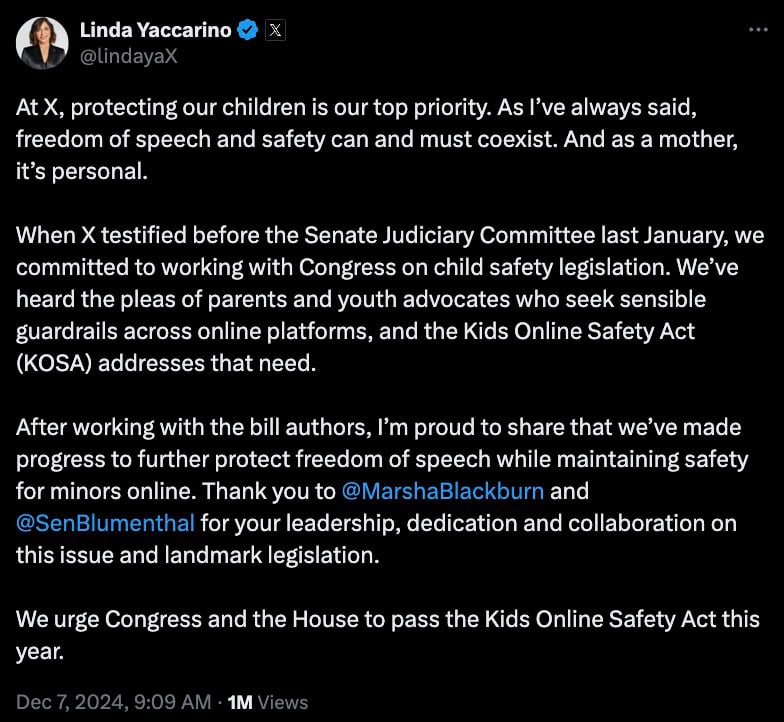As the legislative session nears its conclusion, X CEO Linda Yaccarino has announced her role in revising the Kids Online Safety Act (KOSA), a move seemingly intended to sway hesitant Republican leaders in the House. But skeptics warn that the bill’s approach to protecting children online—through measures likely to lead to age verification—could come at the cost of privacy and online anonymity, leading to the broader adoption of digital ID systems.

Under KOSA, tech platforms would face a “duty of care” to prevent harm to minors, targeting features like infinite scroll and photo filters. While Senators Richard Blumenthal (D-CT) and Marsha Blackburn (R-TN) lauded the updates for “safeguarding free speech online and ensuring it is not used to stifle expression,” privacy advocates argue the bill’s underlying mechanisms remain problematic. They warn that fulfilling KOSA’s requirements could necessitate platforms to verify users’ ages, potentially by tying online activity to government-issued IDs—a move that threatens to erode online anonymity and jeopardize free expression.
While the bill itself does not mandate age verification, it requires a “duty of care” towards content shown to minors that could cause platforms to introduce age verification to avoid liability. Despite the updated text of the bill, it still contains a controversial provision that will likely ultimately pave the way for online age verification (by requiring the Secretary of Commerce, FTC, and FCC to study “options for developing systems to verify age at the device or operating system level”).
X owner Elon Musk has recently criticized Australia for trying to implement a similar bill so it’s unclear why Musk and Yaccarino aren’t aligned on the issue.
Proponents of the bill claim the revisions address concerns of misuse, including clarifying that its provisions cannot be enforced “based upon the viewpoint of users expressed by or through any speech, expression, or information protected by the First Amendment to the Constitution of the United States.” However, this adjustment doesn’t resolve the broader implications of the push for age verification systems, which critics say would effectively link real-world identities to digital activity.
Blumenthal and Blackburn, in their joint statement, dismissed objections to the bill as a “false narrative” that it “would be weaponized by unelected bureaucrats to censor Americans.” However the mechanism for ensuring compliance—age verification—remains a central concern. Platforms would likely be forced to implement digital ID systems, raising alarms about surveillance, data breaches, and a chilling effect on online expression.
While the bill cleared the Senate with overwhelming support, its path in the House remains uncertain. House Speaker Mike Johnson (R-LA) has expressed doubts about the legislation, stating, “I love the principle, but the details of that are very problematic.” House Majority Leader Steve Scalise (R-LA) has been described as even more critical, reportedly questioning the scope of the duty of care provisions.
Yaccarino’s backing of the bill, alongside X’s broader involvement, has added momentum to the push for KOSA. However, major tech companies like Meta and Google have refrained from supporting it, with KOSA’s proponents blaming industry lobbying for stalling progress. Critics counter that the hesitation stems not from industry self-interest but from legitimate concerns about the precedent the bill would set for online privacy.













